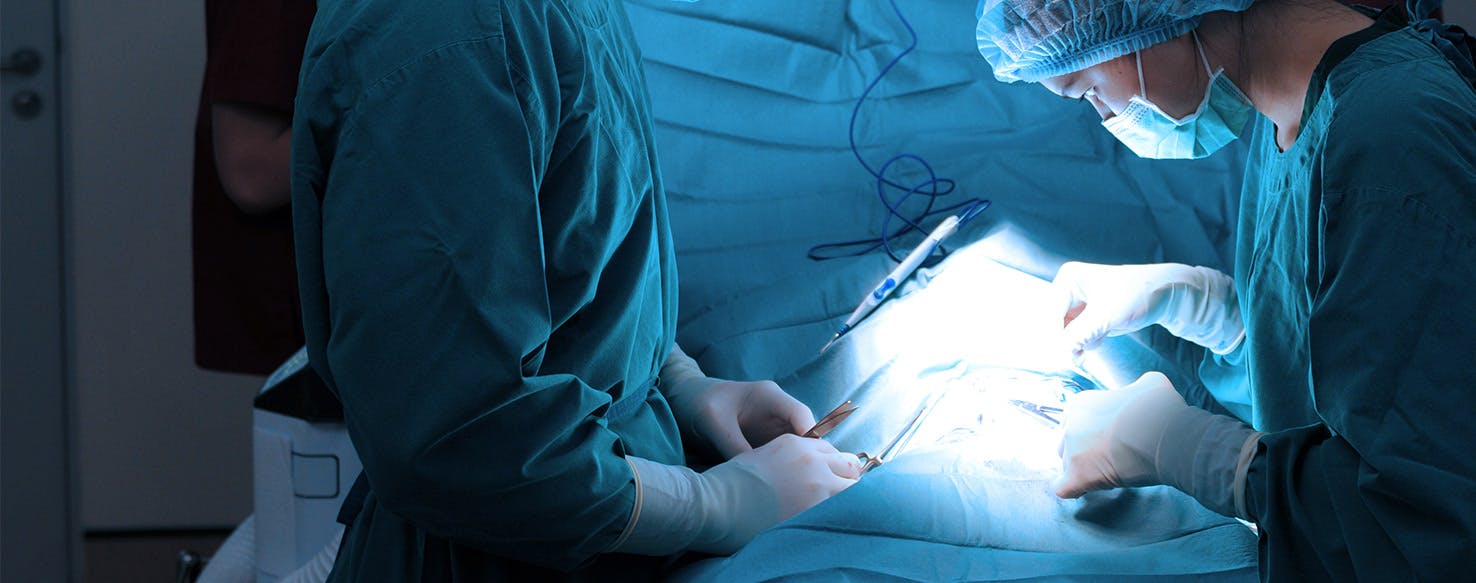- Home
- Dog Wellness
- Reasons and Conditions for Using a Board Certified Veterinary Surgeon
3 min read
Reasons and Conditions for Using a Board Certified Veterinary Surgeon

Save on pet insurance for your pet
You don't have to choose between your pet and your wallet when it comes to expensive vet visits. Prepare ahead of time for unexpected vet bills by finding the pawfect pet insurance.
If your dog needs surgery, the preparation, the emotional strife, and the fear that comes with what will happen before, during, and after the surgery is quite enough to handle. You want to make sure your dog's care is in good hands. Selecting a board-certified surgeon means you have selected a veterinarian who is specialized in their field and has completed advanced training not all veterinarians choose to complete. Your veterinarian may be able to perform certain surgeries within their office. However, more complex surgeries might be referred to a board-certified veterinary surgeon.
Additional Education and Training
Board certified veterinary surgeons have additional, and usually quite intense, training than a regular primary care veterinarian does not have. A board-certified veterinarian will have advanced training to go along with a minimum of four years of veterinary college, one-year internship, and two to three years residency in a program which meets standards set by a specialty college or a veterinary board. This additional education and training for board certified veterinarians can be intense and longer than the training a regular veterinarian would complete. At the end of the service training, a candidate will be required to pass several exams to become board-certified.
There are a number of procedures that may require the services of a board-certified veterinarian.
Total Ear Canal Ablation
Many dogs have chronic ear infections or yeast overgrowth in their ears. When this happens often enough, the ear canal becomes chronically infected, and a complete and total removal of the dog's ear canal may become necessary. A total ear canal ablation is a surgery not typically done in a primary care veterinary office but rather by a board-certified veterinary surgeon.
Paralysis of the Larynx
Laryngeal paralysis occurs mostly in older dogs and sometimes in large breed dogs. The larynx is at the opening of your dog's trachea and is made to open and close on its own as your dog swallows, breathes, or barks. The larynx is designed to close, preventing food from entering the respiratory system causing lung aspiration. When this muscle malfunctions, a laryngeal paralysis surgery is required.
Amputation
Some dogs have trauma or diseases such as cancer that require the complete and total loss of a limb. Amputation is usually a life-saving surgery. There are typically grave reasons to remove an entire or partial limb. The details involved in amputating a dog's limb requires the unique skills of a board-certified veterinary surgeon.
Cancer Mass Removal
Though a regular primary care veterinarian may be able to remove small masses, if your dog is suffering from cancer and requires complex surgery to remove cancer cells from internal organs or requires larger and deeper patches of skin to be removed, your veterinarian may recommend seeing a board-certified veterinary surgeon. Removing cancerous cells and tumors often requires intricate details and working with your dog’s nerves, veins, arteries, and putting the entire system back into place or cutting into deep muscle or bone tissue. It is details such as these that make cancer cell removal surgery intense, requiring specialized training.
Surgery Within the Abdomen
If your dog requires exploratory surgery much more complex than a simple biopsy, a board-certified surgeon may be more qualified than your veterinarian. Anytime your dog's chest cavity or abdomen will be open, your veterinarian will recommend a board-certified veterinary surgeon to perform the delicate tasks required for any complex abdomen surgery.
Bone and Ligament Repair
If your dog has torn a cruciate ligament, CCL or ACL, or if your dog has fractured or dislocated a bone or joint, a board-certified veterinary surgeon would be more qualified to handle the surgery minimizing the risk of future arthritis as well as scarring. Often, board certified veterinary surgeons possess high tech equipment within their office as well as the specialized training to perform delicate surgeries using this kind of technology.
Understand Your Options
There are additional procedures when a board-certified veterinary surgeon might be a better option. Any time your dog needs invasive surgery talk to your veterinarian about the best options available and whether your veterinarian is qualified and trained or if you should speak to a board certified veterinary surgeon. This extra specialized training and technology choices may give you the best care available when your dog needs it most.
You may also like
